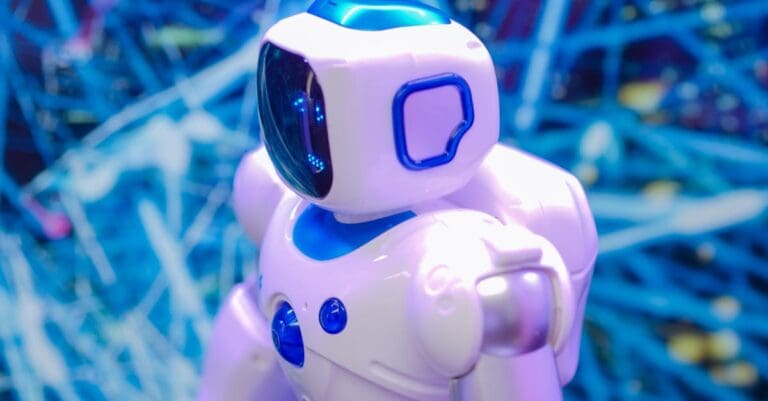Why We Love AI Nanobots (And You Should, Too!)
I’ve always been fascinated by the tiny wonders of technology, especially when it comes to AI nanobots. These minuscule marvels might sound like they’re straight out of a sci-fi movie, but they have the potential to transform the world of medicine in extraordinary ways. Imagine a future where these pint-sized helpers swim through our bloodstream, tirelessly working to improve our health and extend our lives. The idea isn’t as far-fetched as it seems. We’re already seeing glimpses of how these little bots could make significant strides in healthcare, from hunting down cancer cells to potentially extending human life past 120 years.
While the concept of nanobots zipping around inside our bodies might make some of us a bit queasy, the benefits could be phenomenal. Think about medical nanotechnology repairing cells, enhancing organ functions, and even increasing our lifespan. Not to mention, these advancements could revolutionize how we manage diseases like Alzheimer’s or Parkinson’s by addressing problems right at the cellular level. The blend of robotics and medicine offers a tantalizing glimpse into a future where health issues might be tackled with precision and efficiency we’ve never seen before.
You might be wondering how all this works and why it’s important for you. Well, stick around and let’s unravel the fascinating possibilities of nanorobotics together. Trust me, it’s something you won’t want to miss!

Photo provided by Google DeepMind on Pexels
In the article
- AI Nanobots: Transforming Healthcare
- Medical Advancements with AI nanobots
- Innovative Applications in Medical Robotics
- Future Prospects of AI Nanobots
AI Nanobots: Transforming Healthcare
How do you feel about the impact of AI nanobots on healthcare? Personally, I find the idea absolutely fascinating. These tiny machines are transforming the way we approach medicine by improving AI-driven diagnostics and accuracy. Imagine having the power to precisely diagnose diseases, almost like having a superpower! AI nanobots can identify even the smallest issues within our bodies, allowing doctors to start treatment much earlier than ever before. This means patients have better chances of recovery, which is definitely a huge advantage.
AI in Healthcare
Let me give you an idea of how AI in healthcare is changing the game. One major benefit is the revolutionizing patient care with precision. This new technology allows doctors to tailor treatments to individual needs by considering data from numerous sources. For instance, when treating someone with a complex condition like cancer, AI systems can analyze vast amounts of data to suggest the most effective treatment plan. It’s amazing to think about how these advancements are enhancing early detection capabilities and reducing human error in diagnostics.
Have you ever worried about doctors making mistakes during diagnosis? With AI technology, those worries might soon be a thing of the past. AI’s ability to handle enormous amounts of data helps in spotting patterns that humans might miss. Consequently, this reduces the risk of misdiagnosis and leads to more accurate treatments. In my opinion, this is a huge leap forward for healthcare.
Robotics in Medicine
The integration of robotics in medicine is another fascinating development. With micro-robotics, surgeries have become less invasive, and recovery times are shorter. These small robots can assist in minimally invasive surgeries, allowing doctors to perform complex operations with great precision. This means patients experience fewer complications and can return to their normal lives more quickly.
Furthermore, robotics supports complex procedures with precision. Imagine a surgeon using these tiny robots to perform delicate surgeries with utmost accuracy. This level of precision minimizes the risk of errors and complications, making surgeries safer and more efficient. I believe this evolution in medical technology will continue to improve the quality of healthcare for everyone.

Photo provided by Google DeepMind on Pexels
Medical Advancements with AI Nanobots
Nanotechnology is reshaping treatment approaches, offering extraordinary possibilities for medical care. AI nanobots can target cancer cells effectively, which means they can deliver treatments directly to the affected area without harming healthy cells. This revolutionary advancement greatly reduces the side effects commonly associated with cancer treatments, providing patients with a much-improved quality of life.
- Targeting cancer cells effectively, minimizing harm to healthy tissue.
- Repairing cellular damage instantly, offering faster recovery times.
- Replacing biological functions, enhancing quality of life for patients.
Improving organ performance is another potential application of these nanobots. By entering a patient’s bloodstream, nanobots can repair cellular damage and restore normal function. Imagine having the ability to repair damaged tissue or even replace whole organs with the help of these tiny machines. This innovation could extend human life and significantly improve overall health.
AI Medical Technology
AI medical technology helps streamline operations in healthcare settings by reducing paperwork and administrative tasks, allowing healthcare professionals to focus more on patient care. By facilitating personalized treatment plans, AI systems can create tailored strategies that cater to individual needs, offering patients the best possible care.
Integrating seamlessly with existing systems, AI technology continues to evolve, making healthcare more efficient and accessible. By automating repetitive tasks and analyzing data more quickly than humans, AI can significantly improve the overall efficiency of healthcare facilities, leading to better outcomes for patients.

Photo provided by Google DeepMind on Pexels
Innovative Applications in Medical Robotics
Robotic surgery is an exciting field that enhances precision and safety in medical procedures. With robots’ assistance, surgeons can perform operations that might have been too risky or impossible before. This advancement ensures that patients receive the best care available, significantly improving their chances of recovery.
Healthcare Innovation
One of the most remarkable things about healthcare innovation is how it boosts patient outcomes with advanced tools. By introducing new methodologies for treatment, healthcare professionals can offer options that might not have been available in the past. As a result, patients can expect better care and more successful recovery rates.
Moreover, innovation in healthcare allows professionals to adapt quickly to changing needs. As we face new health challenges, such as emerging diseases or changing demographics, having the ability to respond swiftly to these issues is essential. I believe that ongoing innovation will continue to enhance healthcare experiences for everyone involved.

Photo provided by Google DeepMind on Pexels
Future Prospects of AI Nanobots
Nanotechnology and Longevity
Nanotechnology holds promise for extending lifespans and enhancing overall vitality. By repairing cellular damage and optimizing hormonal functions, these tiny machines could help us live longer, healthier lives. Imagine reaching the age of 150 while still enjoying excellent health and energy. This exciting potential has researchers and individuals eager to see what the future holds.
Enhancing energy and focus naturally is another potential benefit of AI nanobots. By streamlining bodily functions and improving mental clarity, these advancements could help us perform at our best every day. I find it exciting to think about how these developments might transform our daily lives.
AI-Driven Diagnostics and Care
Real-time monitoring and analysis are key benefits of AI-driven diagnostics and care. With the help of AI nanobots, healthcare providers can track patients’ health continuously, allowing them to detect issues early on and intervene before conditions worsen.
Optimizing bodily functions proactively means that we can maintain health efficiently and effectively. Imagine a future where AI nanobots continuously analyze your body’s needs, adjusting treatments and dietary recommendations to keep you in the best possible health. As someone interested in health and wellness, I find these developments incredibly promising.
Micro-Robotics in Action
Micro-robotics enables autonomous operations in complex scenarios. Whether performing delicate surgeries or managing intricate medical tasks, these tiny robots can work independently to achieve precise results. This capability offers new possibilities for medical procedures that were once considered too difficult or risky.
Maintaining health efficiently and effectively is another benefit of micro-robotics in action. By automating complex tasks and providing support during procedures, these small machines help ensure that patients receive the best possible care. Personally, I believe that these advances will continue to improve healthcare outcomes and enhance patient experiences.
Potential Challenges of Nanobots
Despite the exciting prospects, there are potential challenges to consider with nanobot development and application. One challenge is the complexity involved in creating and deploying these tiny machines. Balancing innovation with practical use is essential, as we must ensure that new technologies are viable and beneficial for everyone involved.
Addressing safety and ethical concerns is another important aspect of nanobot development. As these technologies continue to evolve, we must carefully evaluate their potential risks and benefits to ensure they are used responsibly and ethically. This balance is crucial to realizing the full potential of nanobot technology in healthcare.
Medical Robotics: A New Era
Exploring possibilities beyond conventional treatments allows medical robotics to expand capabilities in human augmentation. By enhancing overall healthcare experiences, these innovations enable patients and healthcare professionals to achieve better outcomes in various medical scenarios.
I am particularly excited about the potential for medical robotics to improve healthcare experiences. By providing access to advanced tools and methodologies, these technologies allow healthcare providers to offer higher-quality care, ultimately benefiting patients. As we continue to explore new possibilities, I am confident that we will see even more remarkable advancements in the future.
Embracing the Future of Healthcare
I am excited about the potential of tiny technological wonders in revolutionizing healthcare. These advanced tools promise to extend life and enhance its quality in ways we can only dream of today. By replacing or repairing biological structures, they could help us live healthier and longer lives. This isn’t just about extending life; it’s about enriching it through precise medical interventions and enhanced cognitive functions.
To take action, I believe we should stay informed about these technologies and their development. Following reputable research and engaging in discussions can prepare us for the changes ahead. I can also support initiatives and research that promote these advancements, ensuring they are used ethically and effectively in medicine.
Joining the conversation and spreading the word about these tiny technological innovations can make a difference. Sharing this post or similar content can help others understand their potential and the future possibilities in healthcare. Let’s work together to embrace these advancements and pave the way for a brighter, healthier future for everyone.







